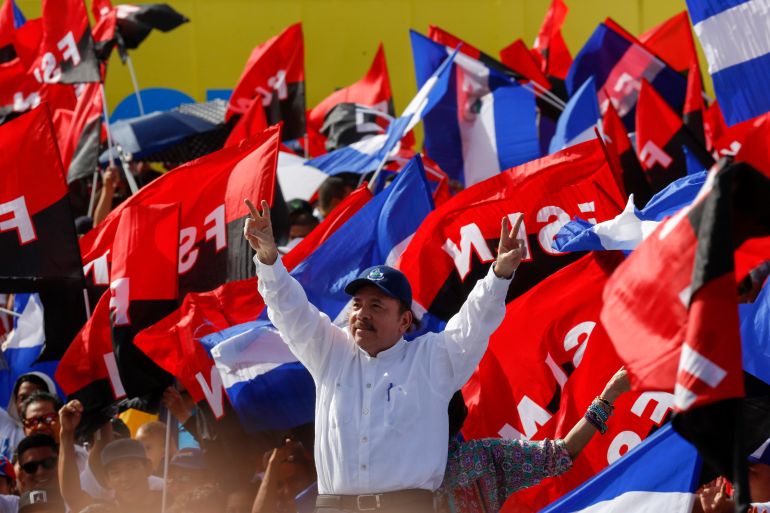US starts investigation into Nicaragua human rights and labor abuses
Trade representative Katherine Tai denounced the government of Daniel Ortega for ‘repressive acts’ against critics.
Nicaraguan President Daniel Ortega celebrates a key anniversary in the Nicaraguan revolution on July 19, 2018, in Managua, Nicaragua [File: Alfredo Zuniga/AP Photo]Published On 11 Dec 202411 Dec 2024
A federal office in the United States charged with shaping foreign trade policies has announced it would launch an investigation into Nicaragua’s government for “persistent attacks on labor rights, human rights and the rule of law”.
On Tuesday, the Office of the United States Trade Representative explained it had received “numerous credible reports” that Nicaragua’s government had committed “repressive” acts, including politically motivated arrests and extrajudicial killings.
“Such actions exacerbate worker exploitation and diminish economic growth and trade opportunities,” the office’s press release read.
The United States trade representative is a cabinet-level position in the US, serving directly under the president. Since 2021, Katherine Tai has served in the role under President Joe Biden and Vice President Kamala Harris.
In Tuesday’s press release, Tai said it was the outgoing administration’s goal to ensure “a worker-centered trade policy”.
“Unfortunately, numerous reports suggest the Government of Nicaragua is engaging in repressive acts that harm Nicaragua’s own workers and people, undermine fair competition, and destabilize our region,” Tai said.
Advertisement
Her decision to investigate Nicaragua’s government was timed to coincide with International Human Rights Day, a date established by the United Nations to raise awareness.
Under the Trade Act of 1974, US trade representatives can open investigations into policies that may harm commerce with the country.
It was the latest in a series of US actions against the government of Nicaragua’s President Daniel Ortega, whose wife, former Vice President Rosario Murillo, recently became his co-president.
The US has already sanctioned multiple Nicaraguan officials and judges for human rights abuses, including stripping dissidents of their citizenship and property in order to silence them.
A leader in the 1979 Nicaraguan revolution, Ortega has long butted heads with the US. He helped to overthrow a US-backed dictator during the revolution, and his first presidency, from 1979 to 1990, faced armed opposition from US-financed right-wing militias.
When Ortega returned to the presidency in 2007, he proceeded to exert control over much of Nicaragua’s government.
Just last month, his allies in the National Assembly gave an initial go-ahead to a constitutional amendment that would grant Ortega and Murillo greater power over virtually all government bodies, including on the regional and municipal level.
It also increased presidential terms to six years and expanded government control over the media and the Catholic Church to prevent “foreign” influence. Ortega has long blamed the US and other international institutions like the Catholic Church of fomenting dissent against his leadership.
Advertisement
Nevertheless, critics both domestic and abroad have warned of violence and oppression under the Ortega government.
Just this week, a human rights group called the Nicaragua Never Again Human Rights Collective, based in neighbouring Costa Rica, released a report about the torture experienced by critics of the regime.
It found that at least 229 political prisoners had experienced “crimes against humanity” while in government detention since 2018.
That year, protests broke out against a government plan to raise taxes and decrease social security benefits, and the government responded with a harsh crackdown.
The Inter-American Commission on Human Rights estimates nearly 2,090 people were detained in the five years after the protests began. More than 355 died.
The Nicaragua Never Again Human Rights Collective found that at least 183 men and 46 women had been tortured by the government, including through beatings, rape and death threats to themselves or their loved ones.
Other alleged forms of torture noted in the report were electric shocks, extended periods of isolation and the forced removal of teeth and fingernails.
